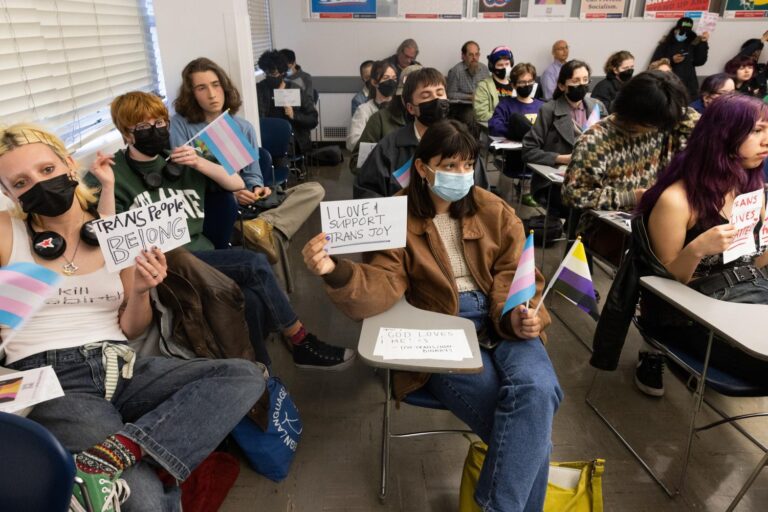Riley Gaines’ Visit to San Francisco State University Ignites Campus Debate on Transgender Athlete Policies
Campus Reaction to Riley Gaines’ Speech at SF State
Riley Gaines, a former NCAA swimmer known for her outspoken views on transgender participation in women’s sports, recently spoke at San Francisco State University (SF State). Her appearance quickly became a flashpoint, drawing a sizable protest from transgender rights advocates on campus. Demonstrators expressed strong opposition to Gaines’ remarks, arguing that her statements risk fostering a hostile atmosphere for transgender students. The protest featured chants, banners, and spirited discussions, mirroring the broader national discourse on gender identity and athletic inclusion.
University administrators stressed their dedication to protecting both the safety of attendees and the principle of free expression. To manage the event’s heightened tensions, SF State implemented a comprehensive security plan, including designated entrances and on-site mediators to encourage respectful exchanges. The following table outlines the measures taken by the university alongside the protesters’ primary demands:
| University Security Measures | Protesters’ Requests |
|---|---|
| Enhanced security personnel deployment | Call for cancellation of Gaines’ event |
| Separate access points for demonstrators | Adoption of transgender-inclusive campus policies |
| Conflict resolution facilitators present | Mandatory diversity and sensitivity training for student groups |
Mobilization of Transgender Rights Advocates at SF State
In response to Gaines’ campus visit, numerous transgender rights supporters assembled near the event venue to voice their concerns and advocate for inclusivity. The protesters highlighted the dangers of misinformation and rhetoric they perceive as harmful to transgender individuals. Slogans such as “Trans Rights Are Human Rights” and “Support Our Trans Community” were prominently displayed, creating a vivid demonstration of solidarity. Informational materials were distributed to educate attendees about the unique challenges faced by transgender students in both academic and athletic settings.
The activists aimed to raise awareness about legislative developments affecting transgender athletes and to strengthen community bonds within the university. Their key demands included:
- Enforcement of inclusive policies in campus sports and academic programs
- Expansion of mental health services tailored to transgender students
- Support for laws protecting transgender individuals from discrimination
| Advocacy Group | Focus Area | Approximate Participants |
|---|---|---|
| SF State Trans Alliance | Student Advocacy | 35+ |
| Bay Area LGBTQ+ Network | Community Engagement | 28 |
| TransAthlete Support Collective | Sports Inclusion | 18 |
Free Speech and Campus Inclusivity: A Delicate Balance at SF State
The events surrounding Riley Gaines’ visit have brought to light the complex interplay between free speech rights and the need for an inclusive campus environment. Gaines, who has publicly criticized policies allowing transgender women to compete in women’s sports, faced vocal opposition from students and faculty advocating for transgender rights. The protest underscored the ongoing challenge universities face in balancing open dialogue with protecting marginalized groups from potentially harmful rhetoric.
Central themes emerging from the campus discourse included:
- Ensuring the safety and dignity of transgender students
- Promoting respectful and constructive debate within academic settings
- Reconciling freedom of expression with community responsibility
| Stakeholder | Primary Concern | Focus During Event |
|---|---|---|
| Transgender Rights Advocates | Protection from discriminatory speech | Opposition to Gaines’ platform |
| Free Speech Proponents | Upholding open expression | Defending Gaines’ right to speak |
| University Leadership | Maintaining campus safety and order | Monitoring and managing protest activities |
Guidelines for Managing Sensitive Discussions on Campus
Navigating contentious topics in academic environments requires a commitment to respectful communication and the safety of all participants. Students, faculty, and event organizers should foster an atmosphere where diverse viewpoints can be expressed without fear of harassment or intimidation. Clear behavioral expectations and robust security protocols are essential to maintaining order and ensuring the event’s message is effectively conveyed.
Effective strategies for managing such events include:
- Advance collaboration: Engage all involved parties, including activists and campus authorities, well before the event.
- Neutral venues: Select locations that allow for efficient crowd control and accessibility.
- Professional mediation: Utilize trained conflict resolution experts to facilitate dialogue during tense moments.
- Transparent communication: Provide clear information about event logistics and expected conduct to attendees.
| Participant | Role | Primary Responsibility |
|---|---|---|
| Event Organizers | Planning and Coordination | Establish rules, liaise with security |
| Activists | Advocacy | Express views peacefully, respect event guidelines |
| Campus Officials | Oversight and Safety | Ensure security, facilitate communication |
| Attendees | Participation | Engage respectfully, adhere to protocols |
Conclusion: Navigating the Complexities of Transgender Rights on Campus
Riley Gaines’ recent engagement at San Francisco State University has illuminated the passionate and often polarized perspectives surrounding transgender rights in collegiate settings. The protests and discussions that ensued reflect the broader societal challenges of balancing free speech with inclusivity and respect for marginalized communities. As institutions like SF State continue to host dialogues on sensitive topics, they must strive to create environments that honor diverse viewpoints while safeguarding the well-being of all students.




